Ethical Issues and Sustainability in Organizational Settings
VerifiedAdded on 2022/10/01
|9
|2469
|468
Essay
AI Summary
This essay examines the interconnectedness of ethics and sustainability within organizational contexts. Part A identifies and analyzes two key ethical issues: workplace discrimination based on race, culture, or gender, and the intrusion of employee privacy through monitoring technologies. The Markula Center Framework, specifically the rights and fairness approaches, is proposed as a solution to address these issues. Part B explores the impact of corporate governance, management, and workplace culture on employee behavior, emphasizing the importance of ethical codes of conduct for productivity and a healthy work environment. The essay reflects on the student's future workplace behavior, highlighting a commitment to treating colleagues fairly, protecting their privacy, and promoting an ethical work environment. It concludes by reiterating the significance of ethical conduct and the role of the management in ensuring ethical practices and code of conduct.
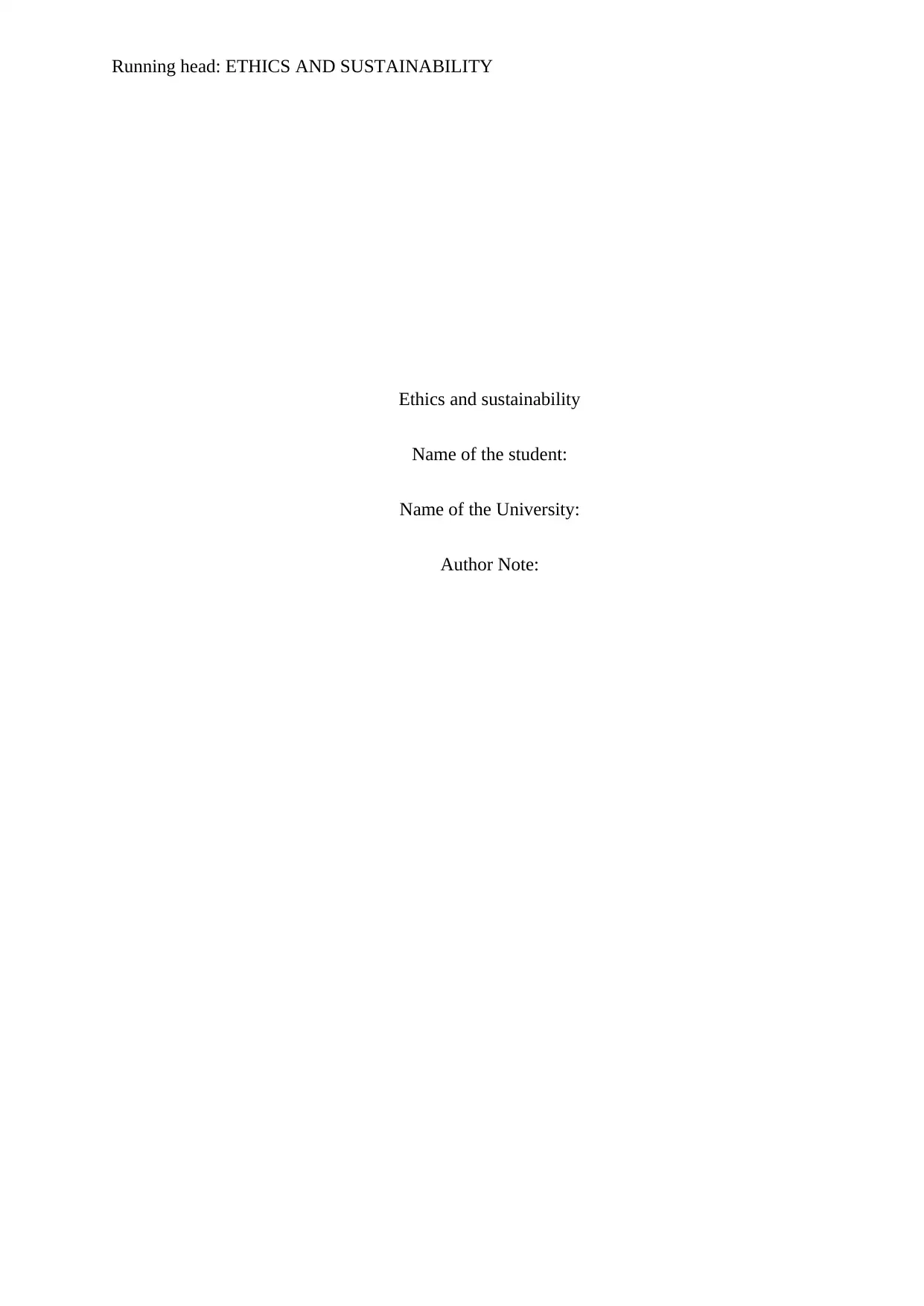
Running head: ETHICS AND SUSTAINABILITY
Ethics and sustainability
Name of the student:
Name of the University:
Author Note:
Ethics and sustainability
Name of the student:
Name of the University:
Author Note:
Paraphrase This Document
Need a fresh take? Get an instant paraphrase of this document with our AI Paraphraser
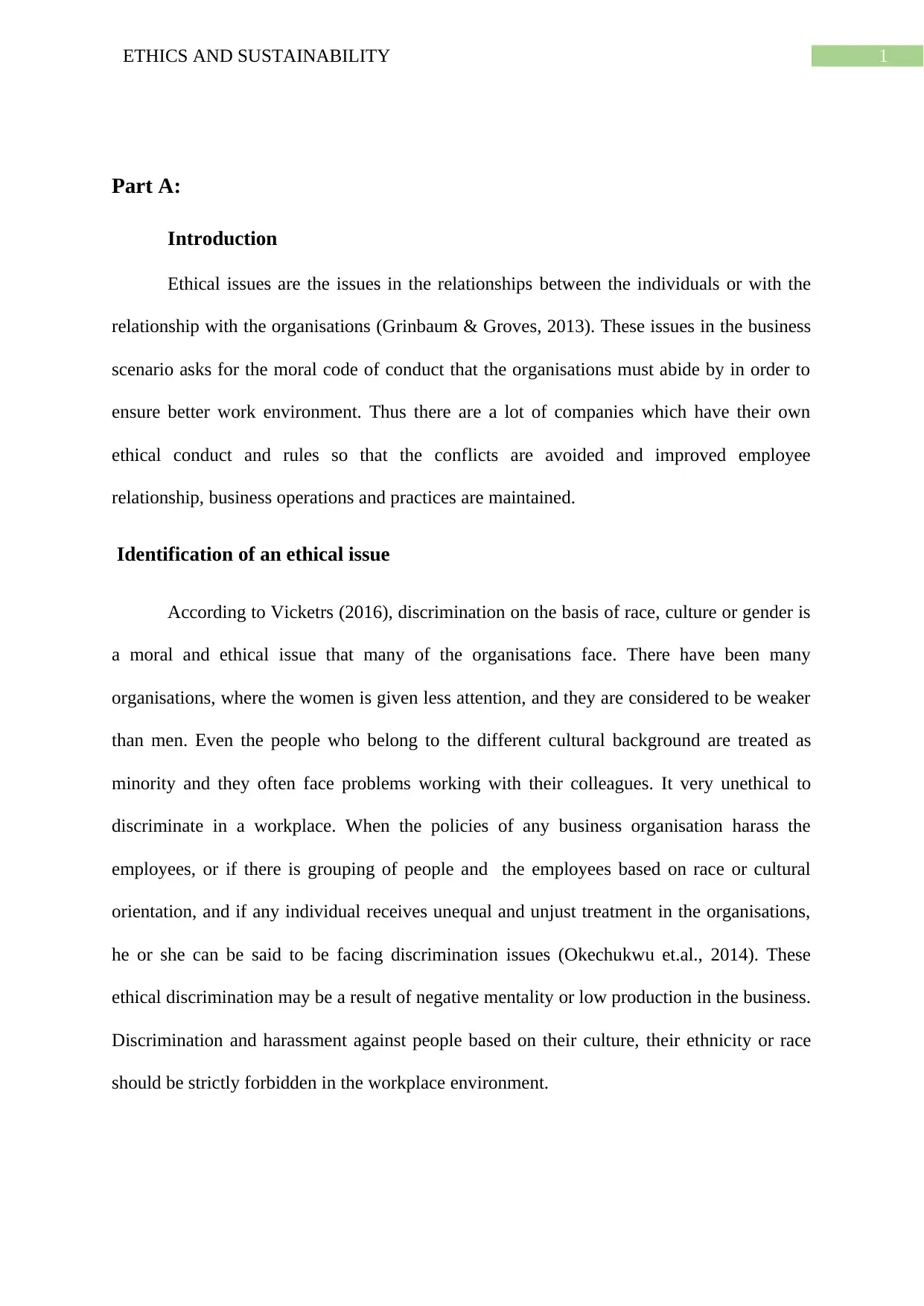
1ETHICS AND SUSTAINABILITY
Part A:
Introduction
Ethical issues are the issues in the relationships between the individuals or with the
relationship with the organisations (Grinbaum & Groves, 2013). These issues in the business
scenario asks for the moral code of conduct that the organisations must abide by in order to
ensure better work environment. Thus there are a lot of companies which have their own
ethical conduct and rules so that the conflicts are avoided and improved employee
relationship, business operations and practices are maintained.
Identification of an ethical issue
According to Vicketrs (2016), discrimination on the basis of race, culture or gender is
a moral and ethical issue that many of the organisations face. There have been many
organisations, where the women is given less attention, and they are considered to be weaker
than men. Even the people who belong to the different cultural background are treated as
minority and they often face problems working with their colleagues. It very unethical to
discriminate in a workplace. When the policies of any business organisation harass the
employees, or if there is grouping of people and the employees based on race or cultural
orientation, and if any individual receives unequal and unjust treatment in the organisations,
he or she can be said to be facing discrimination issues (Okechukwu et.al., 2014). These
ethical discrimination may be a result of negative mentality or low production in the business.
Discrimination and harassment against people based on their culture, their ethnicity or race
should be strictly forbidden in the workplace environment.
Part A:
Introduction
Ethical issues are the issues in the relationships between the individuals or with the
relationship with the organisations (Grinbaum & Groves, 2013). These issues in the business
scenario asks for the moral code of conduct that the organisations must abide by in order to
ensure better work environment. Thus there are a lot of companies which have their own
ethical conduct and rules so that the conflicts are avoided and improved employee
relationship, business operations and practices are maintained.
Identification of an ethical issue
According to Vicketrs (2016), discrimination on the basis of race, culture or gender is
a moral and ethical issue that many of the organisations face. There have been many
organisations, where the women is given less attention, and they are considered to be weaker
than men. Even the people who belong to the different cultural background are treated as
minority and they often face problems working with their colleagues. It very unethical to
discriminate in a workplace. When the policies of any business organisation harass the
employees, or if there is grouping of people and the employees based on race or cultural
orientation, and if any individual receives unequal and unjust treatment in the organisations,
he or she can be said to be facing discrimination issues (Okechukwu et.al., 2014). These
ethical discrimination may be a result of negative mentality or low production in the business.
Discrimination and harassment against people based on their culture, their ethnicity or race
should be strictly forbidden in the workplace environment.
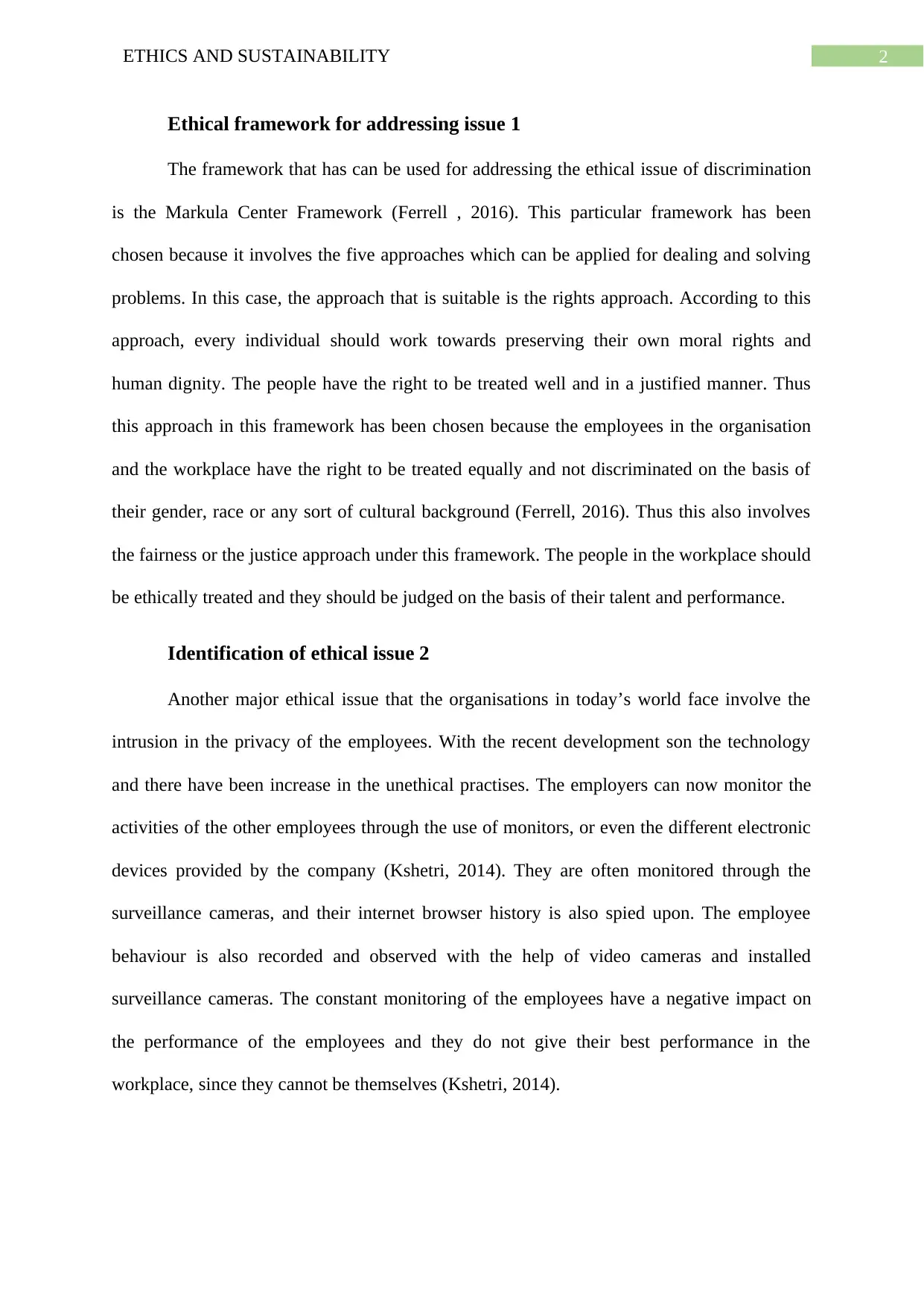
2ETHICS AND SUSTAINABILITY
Ethical framework for addressing issue 1
The framework that has can be used for addressing the ethical issue of discrimination
is the Markula Center Framework (Ferrell , 2016). This particular framework has been
chosen because it involves the five approaches which can be applied for dealing and solving
problems. In this case, the approach that is suitable is the rights approach. According to this
approach, every individual should work towards preserving their own moral rights and
human dignity. The people have the right to be treated well and in a justified manner. Thus
this approach in this framework has been chosen because the employees in the organisation
and the workplace have the right to be treated equally and not discriminated on the basis of
their gender, race or any sort of cultural background (Ferrell, 2016). Thus this also involves
the fairness or the justice approach under this framework. The people in the workplace should
be ethically treated and they should be judged on the basis of their talent and performance.
Identification of ethical issue 2
Another major ethical issue that the organisations in today’s world face involve the
intrusion in the privacy of the employees. With the recent development son the technology
and there have been increase in the unethical practises. The employers can now monitor the
activities of the other employees through the use of monitors, or even the different electronic
devices provided by the company (Kshetri, 2014). They are often monitored through the
surveillance cameras, and their internet browser history is also spied upon. The employee
behaviour is also recorded and observed with the help of video cameras and installed
surveillance cameras. The constant monitoring of the employees have a negative impact on
the performance of the employees and they do not give their best performance in the
workplace, since they cannot be themselves (Kshetri, 2014).
Ethical framework for addressing issue 1
The framework that has can be used for addressing the ethical issue of discrimination
is the Markula Center Framework (Ferrell , 2016). This particular framework has been
chosen because it involves the five approaches which can be applied for dealing and solving
problems. In this case, the approach that is suitable is the rights approach. According to this
approach, every individual should work towards preserving their own moral rights and
human dignity. The people have the right to be treated well and in a justified manner. Thus
this approach in this framework has been chosen because the employees in the organisation
and the workplace have the right to be treated equally and not discriminated on the basis of
their gender, race or any sort of cultural background (Ferrell, 2016). Thus this also involves
the fairness or the justice approach under this framework. The people in the workplace should
be ethically treated and they should be judged on the basis of their talent and performance.
Identification of ethical issue 2
Another major ethical issue that the organisations in today’s world face involve the
intrusion in the privacy of the employees. With the recent development son the technology
and there have been increase in the unethical practises. The employers can now monitor the
activities of the other employees through the use of monitors, or even the different electronic
devices provided by the company (Kshetri, 2014). They are often monitored through the
surveillance cameras, and their internet browser history is also spied upon. The employee
behaviour is also recorded and observed with the help of video cameras and installed
surveillance cameras. The constant monitoring of the employees have a negative impact on
the performance of the employees and they do not give their best performance in the
workplace, since they cannot be themselves (Kshetri, 2014).
⊘ This is a preview!⊘
Do you want full access?
Subscribe today to unlock all pages.

Trusted by 1+ million students worldwide
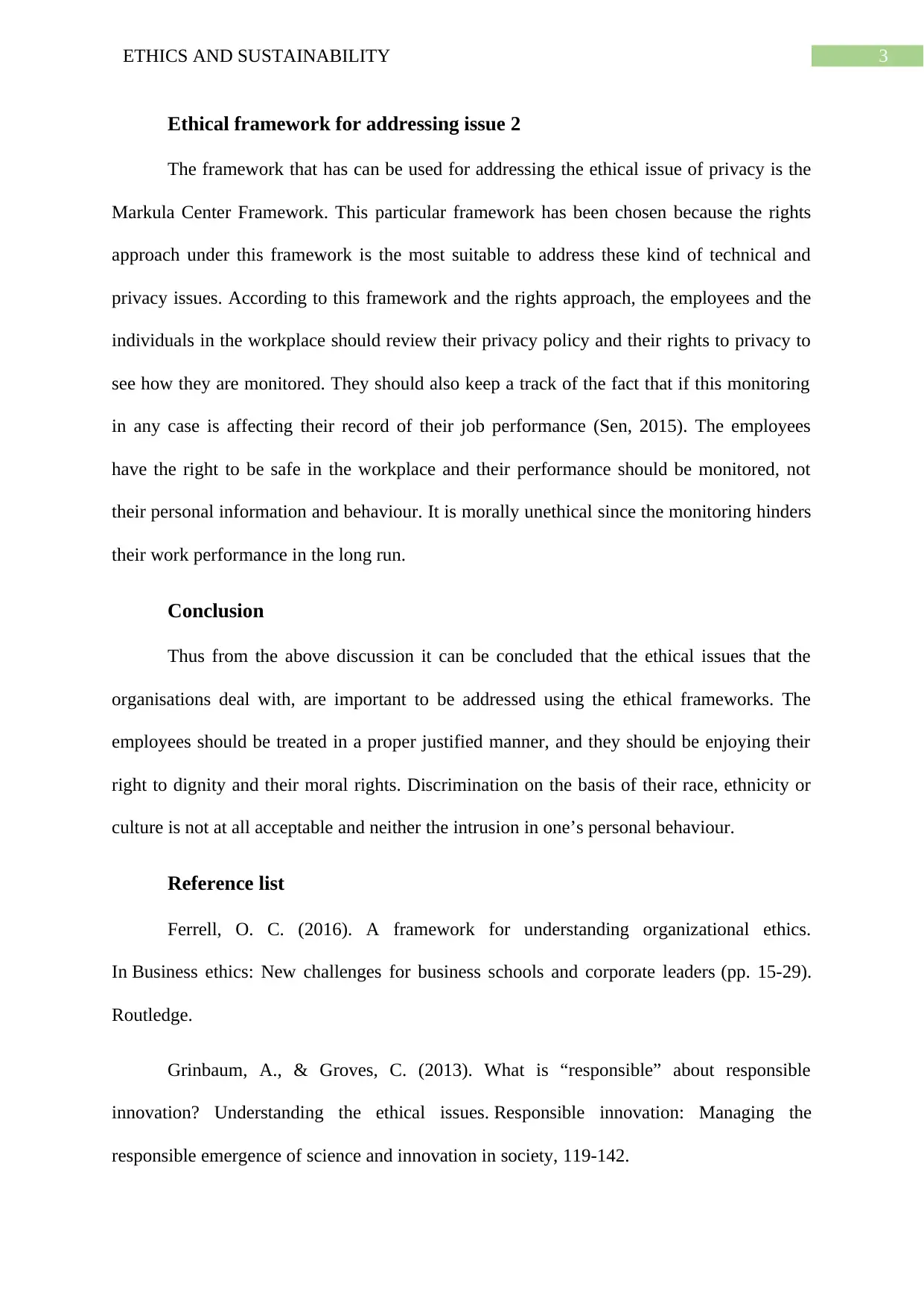
3ETHICS AND SUSTAINABILITY
Ethical framework for addressing issue 2
The framework that has can be used for addressing the ethical issue of privacy is the
Markula Center Framework. This particular framework has been chosen because the rights
approach under this framework is the most suitable to address these kind of technical and
privacy issues. According to this framework and the rights approach, the employees and the
individuals in the workplace should review their privacy policy and their rights to privacy to
see how they are monitored. They should also keep a track of the fact that if this monitoring
in any case is affecting their record of their job performance (Sen, 2015). The employees
have the right to be safe in the workplace and their performance should be monitored, not
their personal information and behaviour. It is morally unethical since the monitoring hinders
their work performance in the long run.
Conclusion
Thus from the above discussion it can be concluded that the ethical issues that the
organisations deal with, are important to be addressed using the ethical frameworks. The
employees should be treated in a proper justified manner, and they should be enjoying their
right to dignity and their moral rights. Discrimination on the basis of their race, ethnicity or
culture is not at all acceptable and neither the intrusion in one’s personal behaviour.
Reference list
Ferrell, O. C. (2016). A framework for understanding organizational ethics.
In Business ethics: New challenges for business schools and corporate leaders (pp. 15-29).
Routledge.
Grinbaum, A., & Groves, C. (2013). What is “responsible” about responsible
innovation? Understanding the ethical issues. Responsible innovation: Managing the
responsible emergence of science and innovation in society, 119-142.
Ethical framework for addressing issue 2
The framework that has can be used for addressing the ethical issue of privacy is the
Markula Center Framework. This particular framework has been chosen because the rights
approach under this framework is the most suitable to address these kind of technical and
privacy issues. According to this framework and the rights approach, the employees and the
individuals in the workplace should review their privacy policy and their rights to privacy to
see how they are monitored. They should also keep a track of the fact that if this monitoring
in any case is affecting their record of their job performance (Sen, 2015). The employees
have the right to be safe in the workplace and their performance should be monitored, not
their personal information and behaviour. It is morally unethical since the monitoring hinders
their work performance in the long run.
Conclusion
Thus from the above discussion it can be concluded that the ethical issues that the
organisations deal with, are important to be addressed using the ethical frameworks. The
employees should be treated in a proper justified manner, and they should be enjoying their
right to dignity and their moral rights. Discrimination on the basis of their race, ethnicity or
culture is not at all acceptable and neither the intrusion in one’s personal behaviour.
Reference list
Ferrell, O. C. (2016). A framework for understanding organizational ethics.
In Business ethics: New challenges for business schools and corporate leaders (pp. 15-29).
Routledge.
Grinbaum, A., & Groves, C. (2013). What is “responsible” about responsible
innovation? Understanding the ethical issues. Responsible innovation: Managing the
responsible emergence of science and innovation in society, 119-142.
Paraphrase This Document
Need a fresh take? Get an instant paraphrase of this document with our AI Paraphraser
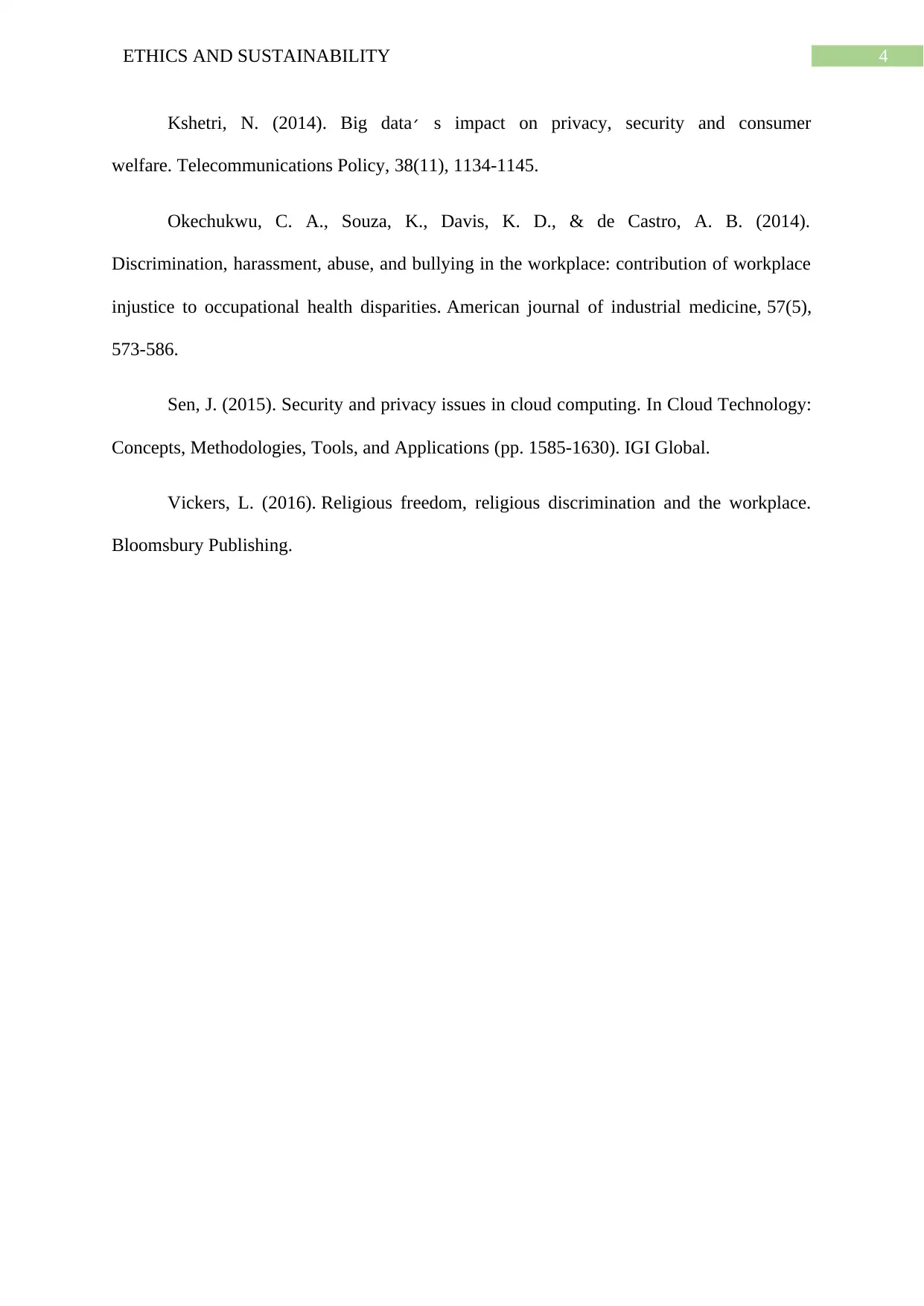
4ETHICS AND SUSTAINABILITY
Kshetri, N. (2014). Big data׳ s impact on privacy, security and consumer
welfare. Telecommunications Policy, 38(11), 1134-1145.
Okechukwu, C. A., Souza, K., Davis, K. D., & de Castro, A. B. (2014).
Discrimination, harassment, abuse, and bullying in the workplace: contribution of workplace
injustice to occupational health disparities. American journal of industrial medicine, 57(5),
573-586.
Sen, J. (2015). Security and privacy issues in cloud computing. In Cloud Technology:
Concepts, Methodologies, Tools, and Applications (pp. 1585-1630). IGI Global.
Vickers, L. (2016). Religious freedom, religious discrimination and the workplace.
Bloomsbury Publishing.
Kshetri, N. (2014). Big data׳ s impact on privacy, security and consumer
welfare. Telecommunications Policy, 38(11), 1134-1145.
Okechukwu, C. A., Souza, K., Davis, K. D., & de Castro, A. B. (2014).
Discrimination, harassment, abuse, and bullying in the workplace: contribution of workplace
injustice to occupational health disparities. American journal of industrial medicine, 57(5),
573-586.
Sen, J. (2015). Security and privacy issues in cloud computing. In Cloud Technology:
Concepts, Methodologies, Tools, and Applications (pp. 1585-1630). IGI Global.
Vickers, L. (2016). Religious freedom, religious discrimination and the workplace.
Bloomsbury Publishing.
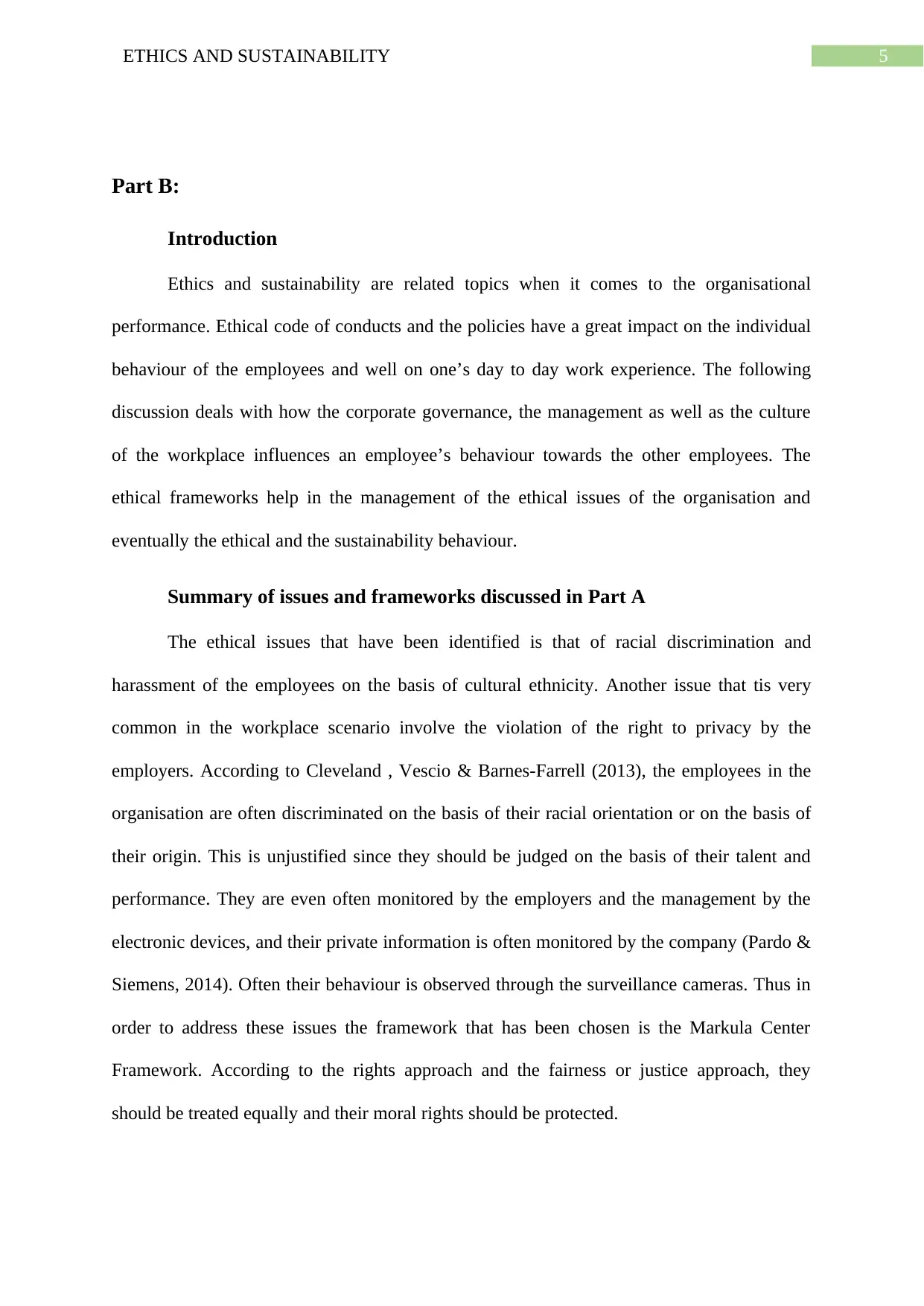
5ETHICS AND SUSTAINABILITY
Part B:
Introduction
Ethics and sustainability are related topics when it comes to the organisational
performance. Ethical code of conducts and the policies have a great impact on the individual
behaviour of the employees and well on one’s day to day work experience. The following
discussion deals with how the corporate governance, the management as well as the culture
of the workplace influences an employee’s behaviour towards the other employees. The
ethical frameworks help in the management of the ethical issues of the organisation and
eventually the ethical and the sustainability behaviour.
Summary of issues and frameworks discussed in Part A
The ethical issues that have been identified is that of racial discrimination and
harassment of the employees on the basis of cultural ethnicity. Another issue that tis very
common in the workplace scenario involve the violation of the right to privacy by the
employers. According to Cleveland , Vescio & Barnes-Farrell (2013), the employees in the
organisation are often discriminated on the basis of their racial orientation or on the basis of
their origin. This is unjustified since they should be judged on the basis of their talent and
performance. They are even often monitored by the employers and the management by the
electronic devices, and their private information is often monitored by the company (Pardo &
Siemens, 2014). Often their behaviour is observed through the surveillance cameras. Thus in
order to address these issues the framework that has been chosen is the Markula Center
Framework. According to the rights approach and the fairness or justice approach, they
should be treated equally and their moral rights should be protected.
Part B:
Introduction
Ethics and sustainability are related topics when it comes to the organisational
performance. Ethical code of conducts and the policies have a great impact on the individual
behaviour of the employees and well on one’s day to day work experience. The following
discussion deals with how the corporate governance, the management as well as the culture
of the workplace influences an employee’s behaviour towards the other employees. The
ethical frameworks help in the management of the ethical issues of the organisation and
eventually the ethical and the sustainability behaviour.
Summary of issues and frameworks discussed in Part A
The ethical issues that have been identified is that of racial discrimination and
harassment of the employees on the basis of cultural ethnicity. Another issue that tis very
common in the workplace scenario involve the violation of the right to privacy by the
employers. According to Cleveland , Vescio & Barnes-Farrell (2013), the employees in the
organisation are often discriminated on the basis of their racial orientation or on the basis of
their origin. This is unjustified since they should be judged on the basis of their talent and
performance. They are even often monitored by the employers and the management by the
electronic devices, and their private information is often monitored by the company (Pardo &
Siemens, 2014). Often their behaviour is observed through the surveillance cameras. Thus in
order to address these issues the framework that has been chosen is the Markula Center
Framework. According to the rights approach and the fairness or justice approach, they
should be treated equally and their moral rights should be protected.
⊘ This is a preview!⊘
Do you want full access?
Subscribe today to unlock all pages.

Trusted by 1+ million students worldwide
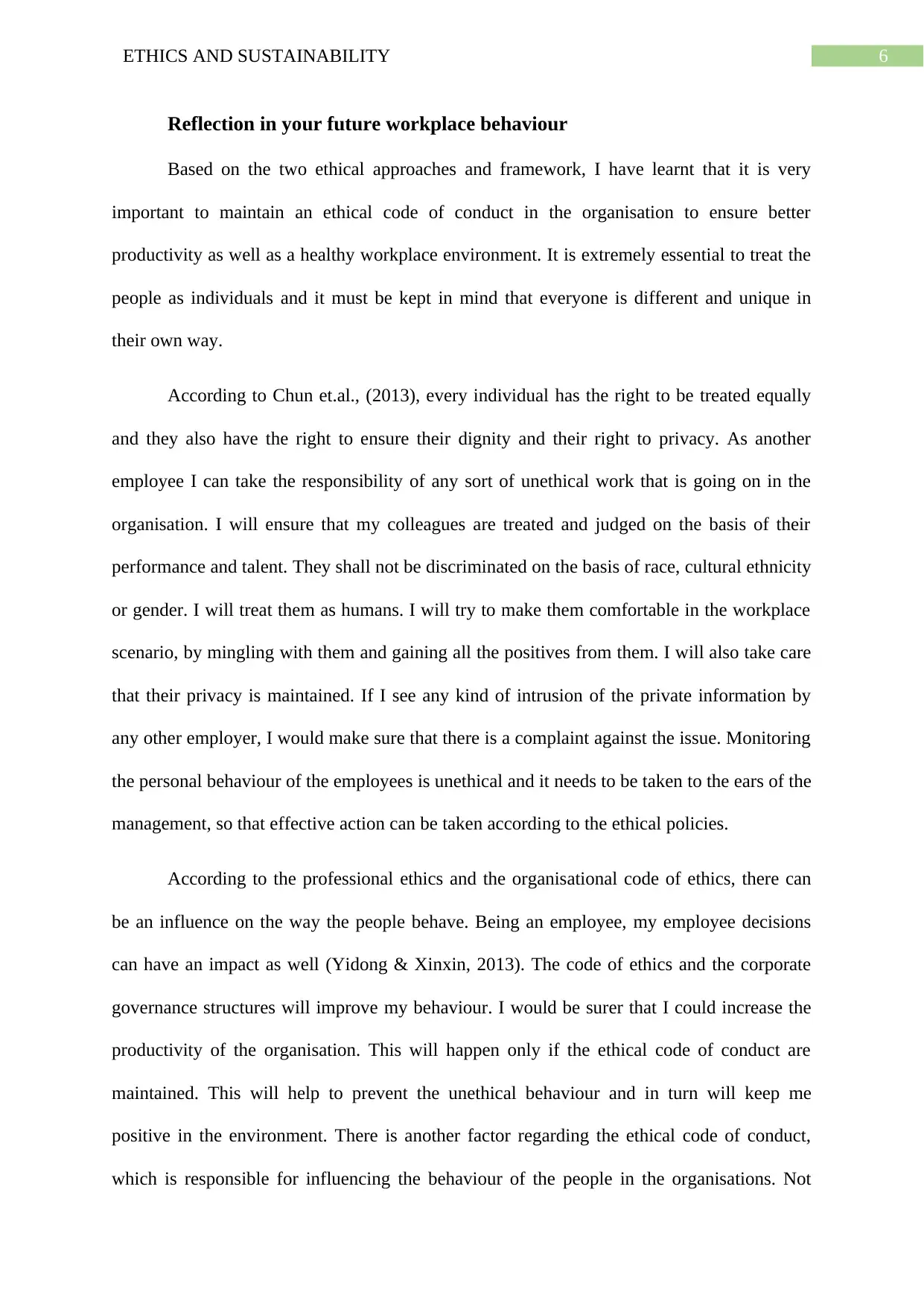
6ETHICS AND SUSTAINABILITY
Reflection in your future workplace behaviour
Based on the two ethical approaches and framework, I have learnt that it is very
important to maintain an ethical code of conduct in the organisation to ensure better
productivity as well as a healthy workplace environment. It is extremely essential to treat the
people as individuals and it must be kept in mind that everyone is different and unique in
their own way.
According to Chun et.al., (2013), every individual has the right to be treated equally
and they also have the right to ensure their dignity and their right to privacy. As another
employee I can take the responsibility of any sort of unethical work that is going on in the
organisation. I will ensure that my colleagues are treated and judged on the basis of their
performance and talent. They shall not be discriminated on the basis of race, cultural ethnicity
or gender. I will treat them as humans. I will try to make them comfortable in the workplace
scenario, by mingling with them and gaining all the positives from them. I will also take care
that their privacy is maintained. If I see any kind of intrusion of the private information by
any other employer, I would make sure that there is a complaint against the issue. Monitoring
the personal behaviour of the employees is unethical and it needs to be taken to the ears of the
management, so that effective action can be taken according to the ethical policies.
According to the professional ethics and the organisational code of ethics, there can
be an influence on the way the people behave. Being an employee, my employee decisions
can have an impact as well (Yidong & Xinxin, 2013). The code of ethics and the corporate
governance structures will improve my behaviour. I would be surer that I could increase the
productivity of the organisation. This will happen only if the ethical code of conduct are
maintained. This will help to prevent the unethical behaviour and in turn will keep me
positive in the environment. There is another factor regarding the ethical code of conduct,
which is responsible for influencing the behaviour of the people in the organisations. Not
Reflection in your future workplace behaviour
Based on the two ethical approaches and framework, I have learnt that it is very
important to maintain an ethical code of conduct in the organisation to ensure better
productivity as well as a healthy workplace environment. It is extremely essential to treat the
people as individuals and it must be kept in mind that everyone is different and unique in
their own way.
According to Chun et.al., (2013), every individual has the right to be treated equally
and they also have the right to ensure their dignity and their right to privacy. As another
employee I can take the responsibility of any sort of unethical work that is going on in the
organisation. I will ensure that my colleagues are treated and judged on the basis of their
performance and talent. They shall not be discriminated on the basis of race, cultural ethnicity
or gender. I will treat them as humans. I will try to make them comfortable in the workplace
scenario, by mingling with them and gaining all the positives from them. I will also take care
that their privacy is maintained. If I see any kind of intrusion of the private information by
any other employer, I would make sure that there is a complaint against the issue. Monitoring
the personal behaviour of the employees is unethical and it needs to be taken to the ears of the
management, so that effective action can be taken according to the ethical policies.
According to the professional ethics and the organisational code of ethics, there can
be an influence on the way the people behave. Being an employee, my employee decisions
can have an impact as well (Yidong & Xinxin, 2013). The code of ethics and the corporate
governance structures will improve my behaviour. I would be surer that I could increase the
productivity of the organisation. This will happen only if the ethical code of conduct are
maintained. This will help to prevent the unethical behaviour and in turn will keep me
positive in the environment. There is another factor regarding the ethical code of conduct,
which is responsible for influencing the behaviour of the people in the organisations. Not
Paraphrase This Document
Need a fresh take? Get an instant paraphrase of this document with our AI Paraphraser
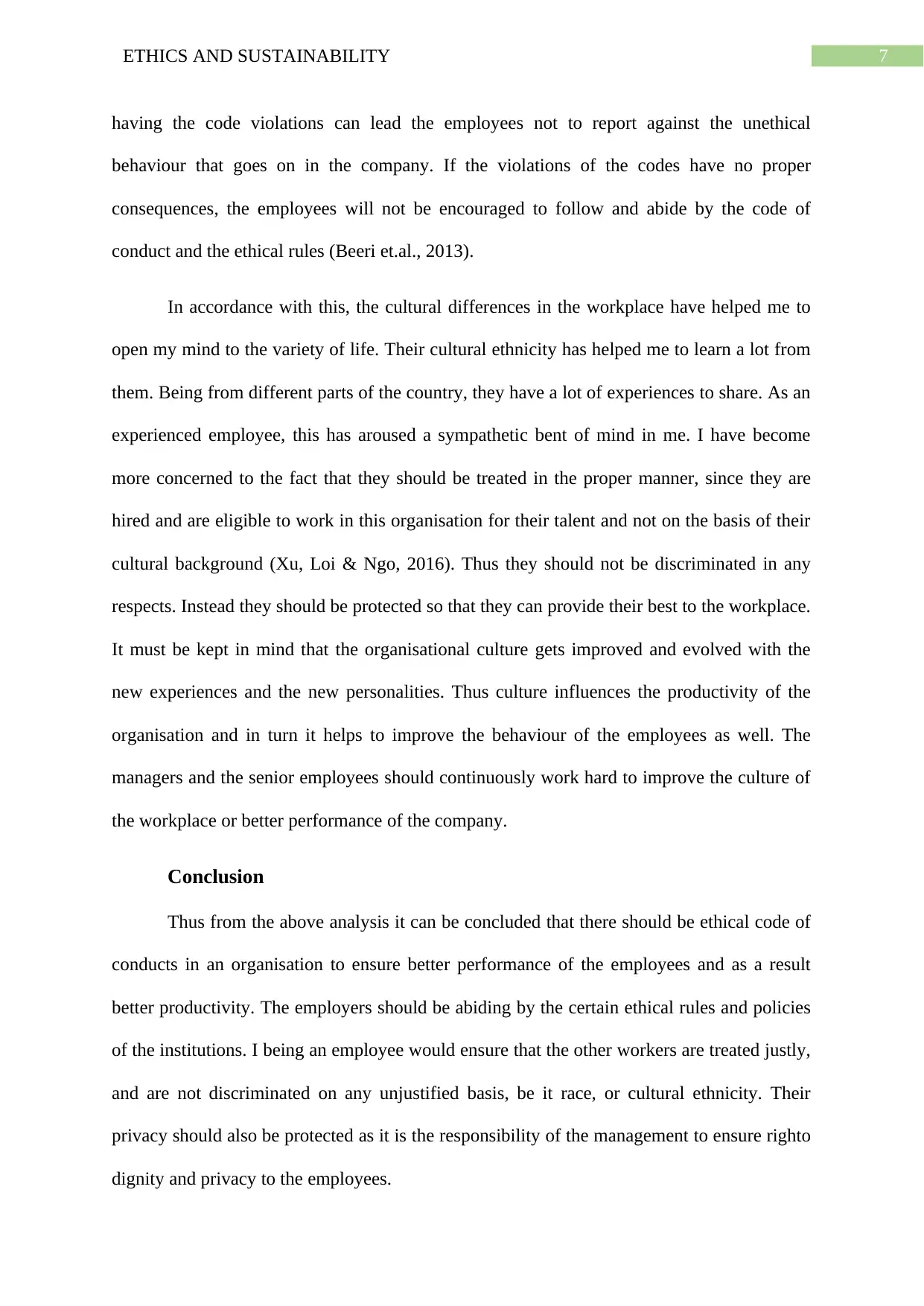
7ETHICS AND SUSTAINABILITY
having the code violations can lead the employees not to report against the unethical
behaviour that goes on in the company. If the violations of the codes have no proper
consequences, the employees will not be encouraged to follow and abide by the code of
conduct and the ethical rules (Beeri et.al., 2013).
In accordance with this, the cultural differences in the workplace have helped me to
open my mind to the variety of life. Their cultural ethnicity has helped me to learn a lot from
them. Being from different parts of the country, they have a lot of experiences to share. As an
experienced employee, this has aroused a sympathetic bent of mind in me. I have become
more concerned to the fact that they should be treated in the proper manner, since they are
hired and are eligible to work in this organisation for their talent and not on the basis of their
cultural background (Xu, Loi & Ngo, 2016). Thus they should not be discriminated in any
respects. Instead they should be protected so that they can provide their best to the workplace.
It must be kept in mind that the organisational culture gets improved and evolved with the
new experiences and the new personalities. Thus culture influences the productivity of the
organisation and in turn it helps to improve the behaviour of the employees as well. The
managers and the senior employees should continuously work hard to improve the culture of
the workplace or better performance of the company.
Conclusion
Thus from the above analysis it can be concluded that there should be ethical code of
conducts in an organisation to ensure better performance of the employees and as a result
better productivity. The employers should be abiding by the certain ethical rules and policies
of the institutions. I being an employee would ensure that the other workers are treated justly,
and are not discriminated on any unjustified basis, be it race, or cultural ethnicity. Their
privacy should also be protected as it is the responsibility of the management to ensure righto
dignity and privacy to the employees.
having the code violations can lead the employees not to report against the unethical
behaviour that goes on in the company. If the violations of the codes have no proper
consequences, the employees will not be encouraged to follow and abide by the code of
conduct and the ethical rules (Beeri et.al., 2013).
In accordance with this, the cultural differences in the workplace have helped me to
open my mind to the variety of life. Their cultural ethnicity has helped me to learn a lot from
them. Being from different parts of the country, they have a lot of experiences to share. As an
experienced employee, this has aroused a sympathetic bent of mind in me. I have become
more concerned to the fact that they should be treated in the proper manner, since they are
hired and are eligible to work in this organisation for their talent and not on the basis of their
cultural background (Xu, Loi & Ngo, 2016). Thus they should not be discriminated in any
respects. Instead they should be protected so that they can provide their best to the workplace.
It must be kept in mind that the organisational culture gets improved and evolved with the
new experiences and the new personalities. Thus culture influences the productivity of the
organisation and in turn it helps to improve the behaviour of the employees as well. The
managers and the senior employees should continuously work hard to improve the culture of
the workplace or better performance of the company.
Conclusion
Thus from the above analysis it can be concluded that there should be ethical code of
conducts in an organisation to ensure better performance of the employees and as a result
better productivity. The employers should be abiding by the certain ethical rules and policies
of the institutions. I being an employee would ensure that the other workers are treated justly,
and are not discriminated on any unjustified basis, be it race, or cultural ethnicity. Their
privacy should also be protected as it is the responsibility of the management to ensure righto
dignity and privacy to the employees.
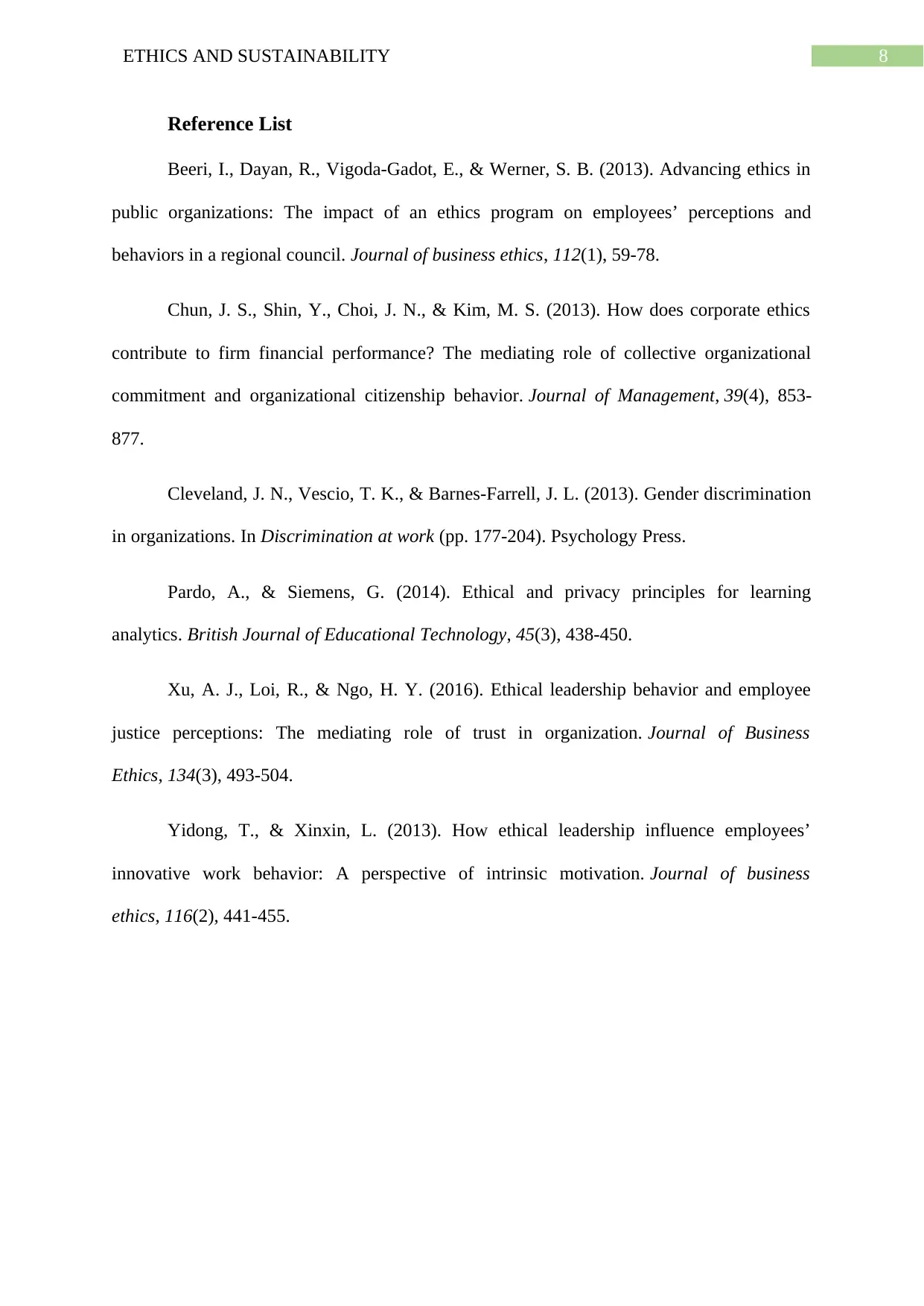
8ETHICS AND SUSTAINABILITY
Reference List
Beeri, I., Dayan, R., Vigoda-Gadot, E., & Werner, S. B. (2013). Advancing ethics in
public organizations: The impact of an ethics program on employees’ perceptions and
behaviors in a regional council. Journal of business ethics, 112(1), 59-78.
Chun, J. S., Shin, Y., Choi, J. N., & Kim, M. S. (2013). How does corporate ethics
contribute to firm financial performance? The mediating role of collective organizational
commitment and organizational citizenship behavior. Journal of Management, 39(4), 853-
877.
Cleveland, J. N., Vescio, T. K., & Barnes-Farrell, J. L. (2013). Gender discrimination
in organizations. In Discrimination at work (pp. 177-204). Psychology Press.
Pardo, A., & Siemens, G. (2014). Ethical and privacy principles for learning
analytics. British Journal of Educational Technology, 45(3), 438-450.
Xu, A. J., Loi, R., & Ngo, H. Y. (2016). Ethical leadership behavior and employee
justice perceptions: The mediating role of trust in organization. Journal of Business
Ethics, 134(3), 493-504.
Yidong, T., & Xinxin, L. (2013). How ethical leadership influence employees’
innovative work behavior: A perspective of intrinsic motivation. Journal of business
ethics, 116(2), 441-455.
Reference List
Beeri, I., Dayan, R., Vigoda-Gadot, E., & Werner, S. B. (2013). Advancing ethics in
public organizations: The impact of an ethics program on employees’ perceptions and
behaviors in a regional council. Journal of business ethics, 112(1), 59-78.
Chun, J. S., Shin, Y., Choi, J. N., & Kim, M. S. (2013). How does corporate ethics
contribute to firm financial performance? The mediating role of collective organizational
commitment and organizational citizenship behavior. Journal of Management, 39(4), 853-
877.
Cleveland, J. N., Vescio, T. K., & Barnes-Farrell, J. L. (2013). Gender discrimination
in organizations. In Discrimination at work (pp. 177-204). Psychology Press.
Pardo, A., & Siemens, G. (2014). Ethical and privacy principles for learning
analytics. British Journal of Educational Technology, 45(3), 438-450.
Xu, A. J., Loi, R., & Ngo, H. Y. (2016). Ethical leadership behavior and employee
justice perceptions: The mediating role of trust in organization. Journal of Business
Ethics, 134(3), 493-504.
Yidong, T., & Xinxin, L. (2013). How ethical leadership influence employees’
innovative work behavior: A perspective of intrinsic motivation. Journal of business
ethics, 116(2), 441-455.
⊘ This is a preview!⊘
Do you want full access?
Subscribe today to unlock all pages.

Trusted by 1+ million students worldwide
1 out of 9
Related Documents
Your All-in-One AI-Powered Toolkit for Academic Success.
+13062052269
info@desklib.com
Available 24*7 on WhatsApp / Email
![[object Object]](/_next/static/media/star-bottom.7253800d.svg)
Unlock your academic potential
Copyright © 2020–2026 A2Z Services. All Rights Reserved. Developed and managed by ZUCOL.





